#opera singers
Text
Almost one month until I start testosterone!
It's also that time of year when directors start sending out their contracts and letters of availability to musicians like myself, and I've had to start coming out to all of them in response. So far, I've gotten nothing but support from everyone and it genuinely makes me so grateful.
The general message I've been sending to them has been as follows:
"As part of my transition, I have decided to undergo hormone replacement therapy, and will be taking testosterone starting May 28th of this year. One of the effects of testosterone (as I'm sure you are aware) is on the voice. Its effects are the same as young men undergoing puberty, so my voice will most likely deepen over time into that of a phenotypically "masculine" voice. This is a decision I do not make lightly, and have come to after many years of consideration. I will be taking regular lessons with Dr. (DM me if you're looking for resources) who specializes in transgender voices as I undergo these changes. My goal is to continue singing at the highest level regardless of how my voice changes, but where it will most comfortably settle and how long that will take is up to genetics and fate. By next year, I may be able to sing tenor or baritone, though I intend to train my upper register to sing countertenor if possible."
Then I thank them and let them know that I'd like to re-audition for their ensembles when my voice has settled more. They've all responded positively and with excitement for me, and the chorusmaster for my city's opera company even said there would be no need, as she knows the work of the professor I'm taking lessons with and thinks I would benefit from being on stage this season(!!!!)
In other news, the symphony I do admin for had their soprano soloist drop out of the Mozart Requiem so guess who's learning the part and performing it in two weeks? Your boy!! It feels a bit kismet. What better way to honor the end of my soprano career than with a requiem?
I'm still nervous to all hell but I'm just so tired of living like this. I just feel like this decision is going to change everything for the better for me.
#trans#transgender#ftm#trans man#ftm trans#lgbt#choir#choral music#choir music#queer#lgbtqia#opera#opera chorus#opera singer#opera singers#trans musicians#transgender musicians#transgender singers#trans singer#trans musician#transgender opera singer#trans opera singer#trans opera singers
27 notes
·
View notes
Photo

GERALDINE FARRAR (1882-1967). American operatic soprano, in the titla role of 'Sister Angelica,' by Giacomo Puccini, c1918.
135 notes
·
View notes
Text
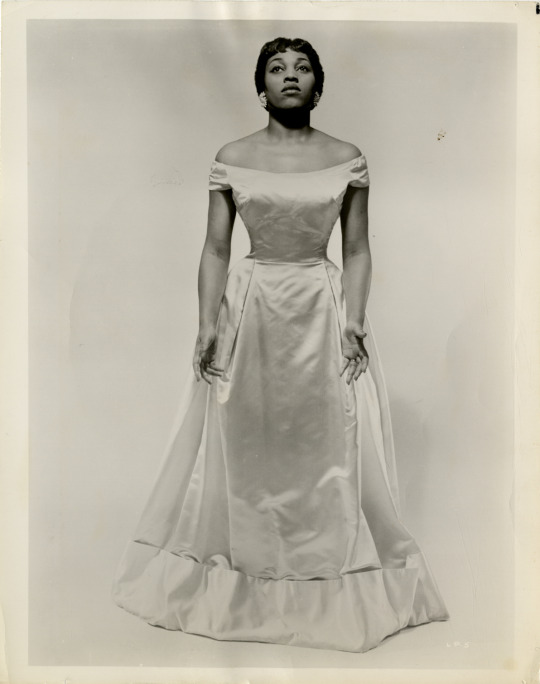
Portrait of soprano Leontyne Price. Stamped on back: "Leontyne Price, soprano."
Courtesy of the E. Azalia Hackley Collection of African Americans in the Performing Arts, Detroit Public Library
#leontyne price#leontyne#music#singer#opera#music history#vintage#singers#opera singer#opera singers#detroit public library
199 notes
·
View notes
Text

Smoking and drinking at Asti's, an Italian restaurant in Greenwich Village, 1946. Many of the waiters at Asti's were professional opera singers who regularly performed for the diners. They would spontaneously jump up on the stage and sing an aria, sometimes inviting a diner to join in.
Photo: Lisette Model via the J. Paul Getty Museum
#Vintage New York#NYC#1940s#Lisette Model#Asti's#restaurant#smoking#drinking#Italian restaurant#Greenwich Village#opera singers#singing waiters
94 notes
·
View notes
Text
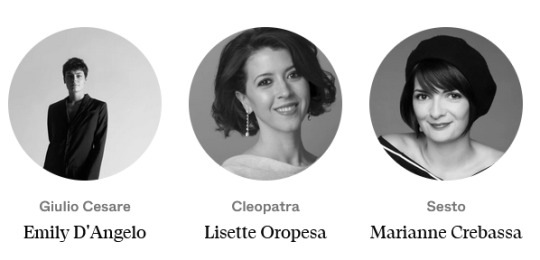

Look at this cast for the Giulio Cesare at the Opéra de Paris next January. Amazing. Costumes look like Asterix in Egypt though ngl.
18 notes
·
View notes
Text
Jessye Norman
youtube
Opera singer Jessye Norman was born in 1945 in Augusta, Georgia. Norman enjoyed a decades-long career as a performer, becoming known for the opulence and beauty of her voice. She made her operatic debut at the Deutscshe Oper, Berlin in 1969. Norman's US debut came in 1982, and her Metropolitan debut the following year. She won numerous awards, including five Grammy Awards, a Kennedy Center Honor, and the National Medal of the Arts. Norman sang at two presidential Inaugurations, at at the 1996 Atlanta Olympics. She established the Jessye Norman School of the Arts, and wrote a memoir, Stand Up Straight and Sing!, which was published in 2014.
Jessye Norman died in 2019 at the age of 74.
19 notes
·
View notes
Text
Fancasts for "An Eternal Crown: The Opera"
I'm being silly now and imagining what it would be like if my gender-bent Magic Flute retelling, An Eternal Crown, were adapted as an opera itself. It could be a "jukebox opera," consisting partly of music from The Magic Flute transposed, and partly of other music – for example, some of Handel's florid bass arias to take the place of the Queen of the Night's arias for King Vorteyo.
Sarisa and Zeran's voices I imagine as essentially Pamina's and Tamino's, since they are those two in reverse: a lyric soprano and a light lyric tenor. Lorikeet I can't help but imagine as a lyric coloratura. Vorteyo would be a bass, Alesta and Imara both motherly mezzos, Kimzi one of those roles like Zerlina that can be sung either by a soprano or a light mezzo, and Robin a lyric baritone. The Three Warriors I picture as a "heroic" Italian-style spinto tenor, and a baritone and bass in more of a Mozartean vein.
These are some of the singers I think might have been good in the roles in different eras:
An Eternal Crown: The Opera, circa 1960-1965
Sarisa: Irmgard Seefried or Gundula Janowitz
Zeran: Fritz Wunderlich or Nicolai Gedda
Lorikeet: Lucia Popp
King Vorteyo: Cesare Siepi
Alesta: Maureen Forrester
Kimzi: Teresa Berganza or Graziella Sciutti
Robin: Hermann Prey or Theodor Uppman
Imara: Marga Höffgen
Three Warriors: Giuseppe di Stefano, Eberhard Wächter, Fernando Corena
An Eternal Crown: The Opera, circa 1980-1985
Sarisa: Ileana Cotrubas
Zeran: Francisco Araiza or Peter Schreier
Lorikeet: Kathleen Battle
King Vorteyo: James Morris
Alesta: Marilyn Horne
Kimzi: Teresa Stratas
Robin: Håkan Hagegård, or a young Alessandro Corbelli
Imara: Janet Baker
Three Warriors: José Carreras, Thomas Allen, Samuel Ramey
An Eternal Crown: The Opera, circa 2000-2005
Sarisa: Ana María Martínez or Dorothea Röschmann
Zeran: Charles Castronovo
Lorikeet: Diana Damrau
King Vorteyo: Samuel Ramey
Alesta: Denyce Graves
Kimzi: Cecilia Bartoli
Robin: Rolando Villazón (it could have been an early light baritone foray for him)
Imara: Stephanie Blythe
Three Warriors: José Cura, Simon Keenlyside, Ildebrando d’Arcangelo
I'll think of more in the future.
7 notes
·
View notes
Video
🎶😅
38 notes
·
View notes
Text
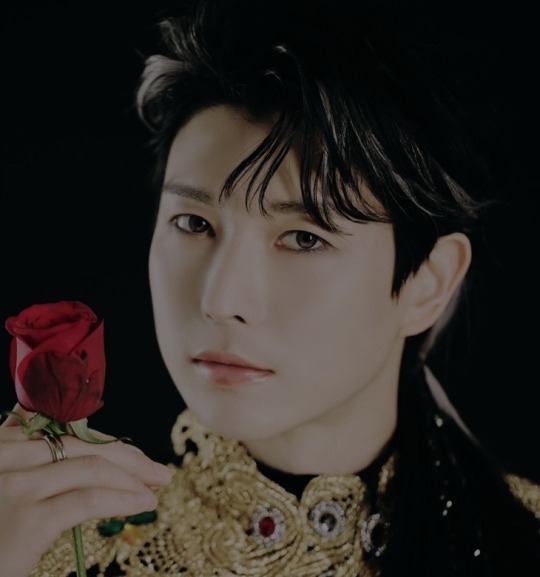





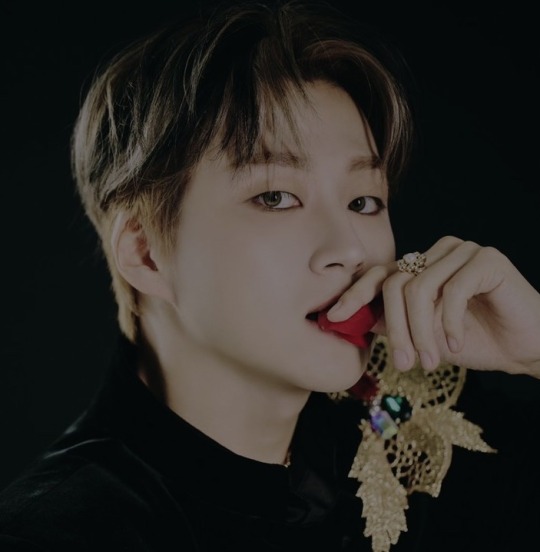


•𝔇𝔶𝔰𝔱𝔬𝔭𝔦𝔞• 𝔗𝔦𝔢𝔯𝔯𝔞𝔰 𝔱𝔞𝔫 𝔬𝔰𝔠𝔲𝔯𝔞𝔰!•
#<3#moodboard#kpop#kpop moodboard#white moodboard#black and white#forestella#opera singers#dystopia#utopia#flowers#roses
2 notes
·
View notes
Photo

Marian Anderson (Feb 27, 1897 - Apr 8, 1993)
Marian Anderson was an American contralto. She performed a wide range of music, from opera to spirituals. Anderson performed with renowned orchestras in major concert and recital venues throughout the United States and Europe between 1925 and 1965.
Anderson was an important figure in the struggle for African-American artists to overcome racial prejudice in the United States during the mid-twentieth century. In 1939 during the era of racial segregation, the Daughters of the American Revolution refused to allow Anderson to sing to an integrated audience in Constitution Hall in Washington, D.C. The incident placed Anderson in the spotlight of the international community on a level unusual for a classical musician. With the aid of First Lady Eleanor Roosevelt and her husband President Franklin D. Roosevelt, Anderson performed a critically acclaimed open-air concert on Easter Sunday, April 9, 1939, on the Lincoln Memorial steps in the capital. She sang before an integrated crowd of more than 75,000 people and a radio audience in the millions.
On January 7, 1955, Anderson became the first African-American to perform at the Metropolitan Opera.
37 notes
·
View notes
Text
Pl*cido D*mingo 🤝 Samuel Ramey
(world-famous opera singers voicing a supporting character that happens to sing, in a cartoon that came out in 2014)
#more opera singers voicing cartoon characters please!!!#the book of life#over the garden wall#opera#opera singers#placido domingo#(i would be much more delighted with the book of life thing if i didn't hate d*mingo's fucking guts)#samuel ramey#opera singers voicing cartoon characters
8 notes
·
View notes
Text
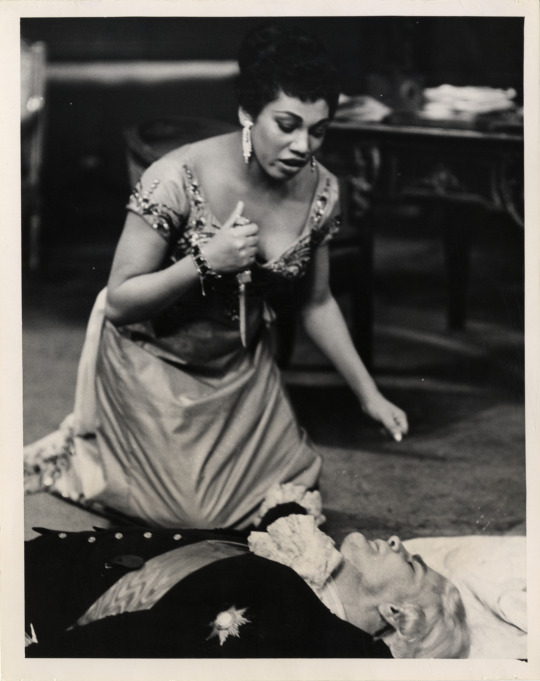
View of soprano Leontyne Price and unidentified singer in Puccini's opera, "Tosca." Stamped on back: "NBC photo." Label on back: "The NBC's Opera 1955 production of 'Tosca,' conceived by Samuel Chotzinoff and featuring David Poleri as Cavaradossi, introduced Leontyne Price to a national television audience in one of the most glamorous of operatic roles and marked the beginning of her progress through the standard operatic repertory after her initial success in 'Porgy and Bess.'" Handwritten on back: "Price, Leontyne. Act II."
Courtesy of the E. Azalia Hackley Collection of African Americans in the Performing Arts, Detroit Public Library
#leontyne price#leontyne#opera#music#tosca#puccini#1955#1950s#nbc#singer#singers#opera singers#detroit public library
128 notes
·
View notes
Text
Relatedy, an interview with Erwin Schrott (2019) about the character Don Giovanni and some other topics.
If you are going to set him as an evil character, with a connection to the dark side, I would portray him as someone who is seeking that final encounter, hoping that one day he has the chance to challenge this highest power as an equal. But if (...) Mozart had wanted to portray Don Giovanni in that way, he’d have given us a diavolo in musica.
I try always to keep Don Giovanni playful because he refuses to take anything seriously. Everything is a game to him, a stage.
I find him a lonely character as well. His life is so superficial. There is no depth in any of his statements or ideas. There is no philosophy to his life.
Don Giovanni is the only character in opera that has the right to break – momentarily – [the "fourth wall"]. He dares to go against anything and anyone
I like this explanation and I also like how he plays the character in practice, fully endorse this version of Don Giovanni.
4 notes
·
View notes
Text
Martina Arroyo
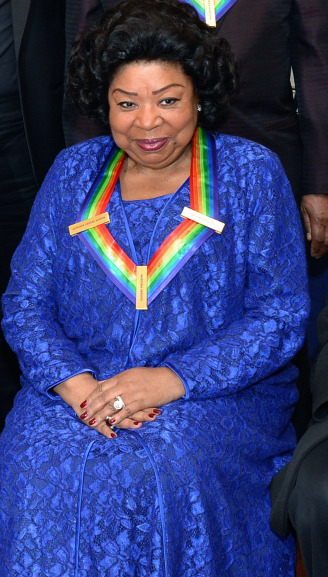
Opera singer Martina Arroyo was born in New York City in 1937. Arroyo made her Carnegie Hall debut in 1958, and went on to earn recognition performing major roles throughout Europe. She gave 199 performances at the Metropolitan Opera, and performed at Paris Opera, La Scala, and Teatro Colon. Arroyo has also done over 50 studio recordings. In 1976, she was appointed to the National Council on the Arts by President Gerald Ford. In 2002, she became a Fellow of the American Academy of Arts and Sciences. In 2013, Arroyo received a Kennedy Center Honor.
23 notes
·
View notes
Text
How to Write an Opera | Classical Composer Sabrina Pena Young
How to Write an Opera | Classical Composer Sabrina Pena Young
Opera is a form of music that originated in Italy during the Renaissance period. It was originally performed by singers who sang recitative interspersed with arias, which were sung solo. In the 18th century, composers began writing operas without any spoken dialogue.
Today, opera is still composed in Italian, but many other languages have been used, including German, French, English, Spanish,…

View On WordPress
#classical composer#classical music composer#composer#opera#opera america#opera singer#opera singers#sabrina pena young#sabrina young#virtual opera
2 notes
·
View notes
Text

Today a special item. The two sisters Giulia Ravogli and are both well known Sopranos and sung often together.
Here we see a original Check from 1893 for a payment of £80 for performances in London, signed by the sisters and Sir Augustus Harris.
Take a look on the biography of this sisters.
#opera#classical music#music history#bel canto#composer#classical composer#aria#classical studies#Giulia Ravogli#Ravogli#mezzo soprano#soprano#Sofia Ravogli#Covent Garden#classical musician#classical musicians#classical history#opera singer#opera singers#musician#musicians#classical singing#classical singer#chest voice#diva#prima donna#maestro#historian of music#history
5 notes
·
View notes